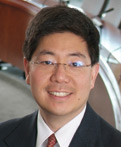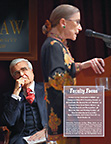William T. Comfort, III Professor of Law
 Originally published in the 2005 issue of the Law School magazine.
Originally published in the 2005 issue of the Law School magazine.
His sister may have soloed with the Boston Pops Orchestra, but Stephen Choi, who joins the faculty this fall from the University of California at Berkeley Law School, hopes to achieve fame through a different route: securities regulations.
Growing up in the Boston suburbs, Choi, 38, would never have guessed that law would be in the cards for him. His grandfather and two uncles were doctors, and his dad, Noah, was a professor at Harvard Medical School. An older brother would become a hospital administrator. His mother, Jae Eun, was a music teacher and his two sisters were musical prodigies. “I have a dead ear,” says Choi, whose mother’s attempts to get him to play the violin and clarinet failed. “I was the black sheep of the family.”
He had shown some promise in science, though, and entered Harvard as a biochemistry major. Then one Friday night after 36 hours in the lab, he recalls, he was performing a laborious experiment in which he had to carefully transfer DNA into a thin vial. “I’m not very coordinated, so instead of it going into the vial it went onto the floor. I decided, ‘I’m not doing this anymore.’”
Luckily, at about that time a non-science course captured his imagination—Justice. “That got me thinking about fairness, consequences and administrative” issues of law-themes he still deals with today.
Choi went on to Harvard Law School, graduating first in his class in 1994. He spent the next year as an associate at McKinsey & Company before becoming a visiting professor and then an assistant professor at the University of Chicago Law School, where he carved out his specialty in securities regulation. While teaching, he completed a Ph.D. in economics at Harvard in 1997. He moved with tenure to Berkeley in 1998 where he was appointed the Roger J. Traynor Professor of Law, before being lured to the New York University School of Law.
Choi is a prolific writer with at least 32 published works under his belt, including theory papers on securities regulations; securities class action empirical studies; and a series of papers on the judiciary. His research focuses on how to protect investors in an increasingly complex securities market. “A delicate balance exists here. There’s no doubt that a strong system of securities regulations gives investors confidence. But regulators can often make mistakes and face large pressures to be seen as ‘doing something,’ particularly in the wake of a large scandal such as Enron. Too much regulation can be just as much a problem as too little.” Recently Choi cowrote “Behavioral Economics and the SEC” in the Stanford Law Review, which examines how behavioral quirks may lead the SEC to overregulate. Another cowritten article, “How to Fix Wall Street: A Voucher Financing Proposal for Securities Intermediaries,” published in the Yale Law Journal, explores conflict of interest problems among Wall Street analysts and the possibility of market-based solutions to these problems. And his recent 700-page casebook, Securities Regulation: Cases and Analysis (Foundation Press), the first to include a hypothetical case study that examines a Martha Stewart–like, insider trading–related scenario, is his biggest undertaking to date.
“Steve has a knack for picking important issues in investor protection and performing a very detailed, empirical analysis that is helpful in setting regulatory policy,” says Robert Daines, Pritzker Professor of Law and Business at Stanford Law School (and former Law School professor). “His pieces on the effect of recent securities regulation reform, such as in corporate elections, the issuance of securities and regulating investor lawsuits against corporations, are unmatched.”
Choi and his wife, Un Kyung, and their three children have already settled into New York City. The kids adore the dinosaurs at the Museum of Natural History, and Choi loves his newfound proximity to Wall Street, the hub of the securities industry. “I couldn’t imagine being at a better place,” he says of the Law School and the city. “But at baseball games,” he admits, “I still root for the Red Sox.”
—
